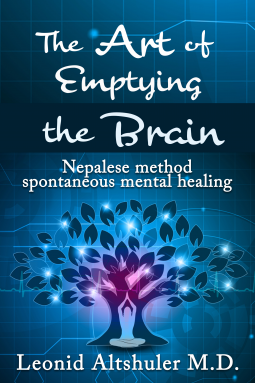
The Art of Emptying the Brain
by Dr. Leonid Altshuler M.D
This title was previously available on NetGalley and is now archived.
Send NetGalley books directly to your Kindle or Kindle app
1
To read on a Kindle or Kindle app, please add kindle@netgalley.com as an approved email address to receive files in your Amazon account. Click here for step-by-step instructions.
2
Also find your Kindle email address within your Amazon account, and enter it here.
Pub Date 30 Nov 2018 | Archive Date 3 Feb 2019
Talking about this book? Use #TheArtOfEmptyingTheBrain #NetGalley. More hashtag tips!
Description
Dr. Leonid Altshuler M.D., a board-certified psychiatrist, went through years of misdiagnosis and suffering before he discovered an innate connection between stress, diet and physical and mental illnesses.
In this book Dr. Altshuler describes a unique method called the Art of Emptying the Brain that he was taught in Nepal where he lived in a monastery studying different meditation techniques taught by a Master.
He was dealing with a lot of stress at that time in his personal and professional life and was eagger to find a treatment to relieve stress. But he was told from the beginning by the Master that he could not study any techniques because he was not ready.
He said that if Dr. Altshuler started meditating right away without preparation then eventually, he would cause a lot of emotional problems for himself.
He said that Westerners have a restless mind and cannot just jump to practice meditation right away , they need to learn specific technique first to be able to empty their mind and only then begin meditation.
He said that the preparation stage would be discharging unwanted emotions, memories and images spontaneously and the task would be not to interfere in the process.
Dr, Altshuler has been teaching this unique Nepalese technique to all his patients who are interested in studying meditation. He achieves excellent results utilizing this method in the treatment of depression, anxiety and chronic insomnia.
This book does not replace the advice of your medical practitioner, it is intended to support the work of your medical practitioner and to help you or a loved one to achieve good health.
Available Editions
| ISBN | 0000000000000 |
| PRICE | |
Links
Featured Reviews
On a friend's suggestion, looking to escape his unrelenting inner turmoil, the author made a pilgrimage to Nepal to investigate the art of meditation instructed by a true master. Little did he know at the time that his life was about to make a drastic change - for the better. Finding it difficult at first, he finally broke down the tormenting walls of his mind and discovered that his ever-present negativity in life had greatly diminished. It had always been a heavy weight on his shoulders.
A psychiatrist for many years, he was eager to share the newly-acquired meditation techniques among his many patients. He felt confident that these proven techniques would prove successful for them as well. What's good for the goose is good for the gander.
As a result, for the first time in his long medical career, there was no longer the need to write prescriptions for treating various types of mental ailments. When performed correctly, meditation offered a holistic approach, specifically, for treating depression. In an immeasurable way, his positive impact on lives made the world a better place to live. Every little bit helps. Namaste.
I send my thanks to NetGalley and BooksGoSocial for the ARC in exchange for an unbiased review.
 Elaine T, Reviewer
Elaine T, Reviewer
This book tells about the experiences of the author, Dr Altshuler an American psychiatrist, who, fed up with the stress and health problems in his own life, goes to live in a Nepalese monastery for a period of time.
There under the tutelage of a Master he learns to meditate, but first he has to go through a process of readying himself by learning to calm and empty his brain. Dr Altshuler undergoes such a personal transformation as a result of his lessons in meditation that he decides to take his learning back to his patients at home. There he uses it with great success to help those with anxiety, depression or insomnia.
As somebody who does meditate I found the book interesting, if a little on the short side.
 Librarian 296405
Librarian 296405
A fascinating little book - more like a chapter than an actual book but I will explain why that's not actually a bad thing in this case.
I love books with a single change technique - it makes life so much easier when you can focus on learning one skill thoroughly rather than a whole system of change which...let's face it... who has the time?
Other books like 'The Five Second Rule' contain a single technique with a simple premise...but then take 200 pages to support it. I realise many people are so skeptical they need 200 pages of convincing but having to READ those 200 pages to find out there was nothing else you needed to know is a waste of time.
So the art of emptying your brain claims to offer a pre-technique technique - something to use before you use all other personal development techniques. It backs this up with a certain amount of scientific evidence - but not so much that you get lost. It states it claims... and then gets out.
If you are looking for a 'solution to everything book' this is not it. But there are meta-skills which sit above our everyday interactions - the skill of persuasion for instance - which help us operate more successfully everywhere. As I have some experience of this technique in this book elsewhere, I believe this book contains an essential skill that will have benefits everywhere.
However, at 30 minutes a day for a week - some people will unfortunately be too busy to benefit from it - and they are often the ones that need it most.
 Dyane H, Reviewer
Dyane H, Reviewer
This is a short but worthwhile read that was well written. I really enjoyed reading about Dr. Altshuler's incredible journey to the monastery and his experience with an unforgettable monk. This book is a very interesting examination of one's life and can also be very useful as well. I recommend "The Art of Emptying the Brain" to all readers interested in self-improvement, mindfulness, and meditation.
 Kelly V, Reviewer
Kelly V, Reviewer
As a person with a physical chronic illness that is, at least in part, stress-related, I'm always very curious about alternative ways to master my illness. I am also a worrier, certain events keep replaying in my mind, especially at night, and obviously when I fret I can't sleep. In other words: if there is a way of emptying my mind, I'd love to know about it, which is why I picked up this book. Did it deliver? Yes, it most certainly did. The author takes us back to the when and how of his discovery of this art of emptying the brain, which was interesting, also because it was kept short, and then proceeds to explain what we, rat racers that we are, can do to empty our brain and find happiness. Part of this is actually stating the obvious, telling us things we probably already know, but although we might know the philosophy, we do not live by it, and in that aspect, it is great to be reminded. Very practical, very to the point, very short, not at all spacey or dreamy or mystic, just really straightforward and logical advice to find peace of mind.
Review was also posted on Amazon.
 Charla S, Bookseller
Charla S, Bookseller
Western MD Dr. Leonid Altshuler briefly shares his experiences in a monastery in Nepal where he makes the transition from a mindset of DOING to one of BEING. He documents his mental struggles in being alone with himself, the difficulties he encountered and how that stress resolved itself through following the process outlined by the spiritual Master there. Also included are several excellent techniques from a scientific perspective regarding stress reduction and the medical science behind why those techniques are effective.





